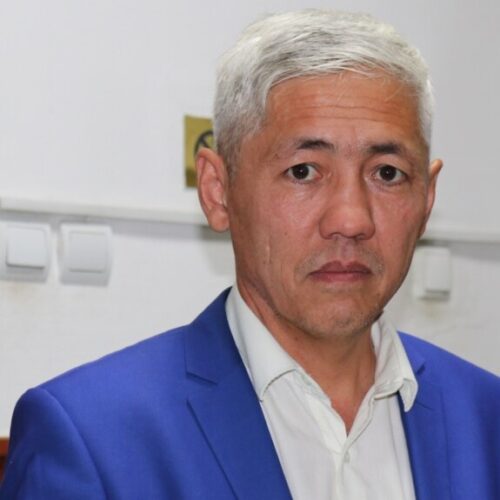Five-year Prison Sentence for Facebook Posts in Kazakhstan
This statement can be attributed to the Clooney Foundation for Justice. For further inquiries, please contact [email protected]

Activist Ashkat Zheksebaev, who spent a year in a maximum-security pre-trial detention center in Kazakhstan, has been sentenced to five years in prison for Facebook posts and Telegram messages that encouraged people to join an opposition party and attend rallies.
Mr. Zheksebaev was convicted of creating and participating in an “extremist group” and has been forbidden from engaging in political activities, a decision he’s now appealing. The Clooney Foundation for Justice, whose TrialWatch Initiative monitored his trial, calls on the Almaty City Court of Appeals to reverse Mr. Zheksebaev’s conviction and order his acquittal.
The Koshe Party, which Mr. Zheksebaev encouraged people to support, has been characterized by the European Parliament as a peaceful opposition movement, however, Kazakhstan has branded it “extremist” and banned the party.
Mr. Zheksebaev’s case is one of 135 recent prosecutions in Kazakhstan for alleged participation in “extremist” political groups, including the trial of blogger Aigul Otepova, who was convicted on similar charges. Ms. Otepova’s trial was monitored by CFJ’s partner, the American Bar Association Center for Human Rights, as part of TrialWatch.
“This abusive prosecution, part of an avalanche of cases under Kazakhstan’s vague and expansive anti-extremism law, violated Mr. Zheksebaev’s rights to a fair trial and to freedom of expression,” TrialWatch Expert Stephanie Farrior said.
The indictment alleges that Mr. Zheksebaev’s Facebook posts encouraged “people who want to be truly independent, develop and prosper [to] … unite in our movement,” and demonstrated his “dissatisfaction with the socio-political situation in [Kazakhstan as] a negative assessment of the current government.” Because of this, the prosecution claimed the posts posed a “real threat to the foundations of statehood and national security.” Prosecuting Mr. Zheksebaev for political speech and participating in a political group violated his rights to freedom of expression and assembly under Articles 19 and 21 of the International Covenant on Civil and Political Rights. It also violated his right to participate in public affairs and discriminated against him based on his political views. In addition, punishing him for the legitimate exercise of these rights violated his right to be free from arbitrary arrest and detention.
During the trial, the court ignored numerous requests to provide the defense with the court decision banning the Koshe Party, violating Mr. Zheksebaev’s right under Article 14 of the Covenant to a full explanation of the nature of the charges and thus adequate time and facilities to prepare a defense.
The court also disregarded the fact that the Koshe Party had not even been banned at the time of the Facebook posts, making the prosecution a violation of the rule prohibiting the retroactive application of criminal laws.
Furthermore, the judge threatened to revoke the defense lawyers’ licenses, interrupted and muted other co-defendants on the stand, and removed one of the defense lawyers from the trial, all of which violated the right to a fair trial, and prompted the defense to demand the judge’s recusal.
When he took the stand, Mr. Zheksebaev said that the result of the trial was a foregone conclusion: it was “purely formal,” he said, adding the trial was “going on illegally.”
“The proceedings were marred by egregious rights violations from start to finish—starting with the prosecution’s refusal to hand over the court decision banning the party Mr. Zheksebaev supported,” Ms. Farrior added.
Background
Mr. Zheksebaev is an activist who has protested in support of political prisoners and democracy in Kazakhstan.
Based on Facebook posts from April and May 2020 and Telegram messages from early June 2020, he was charged with creating and participating in an extremist group under Articles 182 and 405 of the Criminal Code of Kazakhstan. These articles criminalize “[p]articipation in activity of [an] extremist group or crimes” and “direct implementation of actions for extremist purposes, including public calls for such actions, propaganda, agitation and public display of symbols of extremist organizations.” Articles 182 and 405 are vague and overbroad, and inconsistent with international standards.
The prosecution based the charges on a May 19, 2020 court decision that found that the Koshe Party, to which Mr. Zheksebaev belonged, was an “extremist organization.” However, this decision went into legal effect only after the Facebook posts in question. In fact, Mr. Zheksebaev maintained that after the May 19 decision banning the party went into legal effect, he and the Koshe Party stopped all advertising and publications to recruit new members. Despite this timeline, the court insisted in its judgment that the “defendants were adherents of the ideas promoted by the DCK” – a different allegedly extremist group that had been banned earlier – and that the Koshe party was just a new name for the DCK.
At trial, when defense counsel repeatedly requested a copy of the May 19 court decision, the court refused to provide it without any explanation. Defense counsel also repeatedly requested the judge’s recusal, with one defendant asserting that “[f]rom the very beginning of the trial, the judge did not behave very well, he began to insult one of the lawyers. He [was] in a hurry, although he said that he would conduct his own judicial investigation… It seems that he [was] not even familiar with our case and [got] acquainted with it during the trial.” The court rejected these recusal motions, suggesting instead that the defendants could mention their “lack of confidence in the judge” on appeal.
A full Fairness Report on the case will be made available soon.